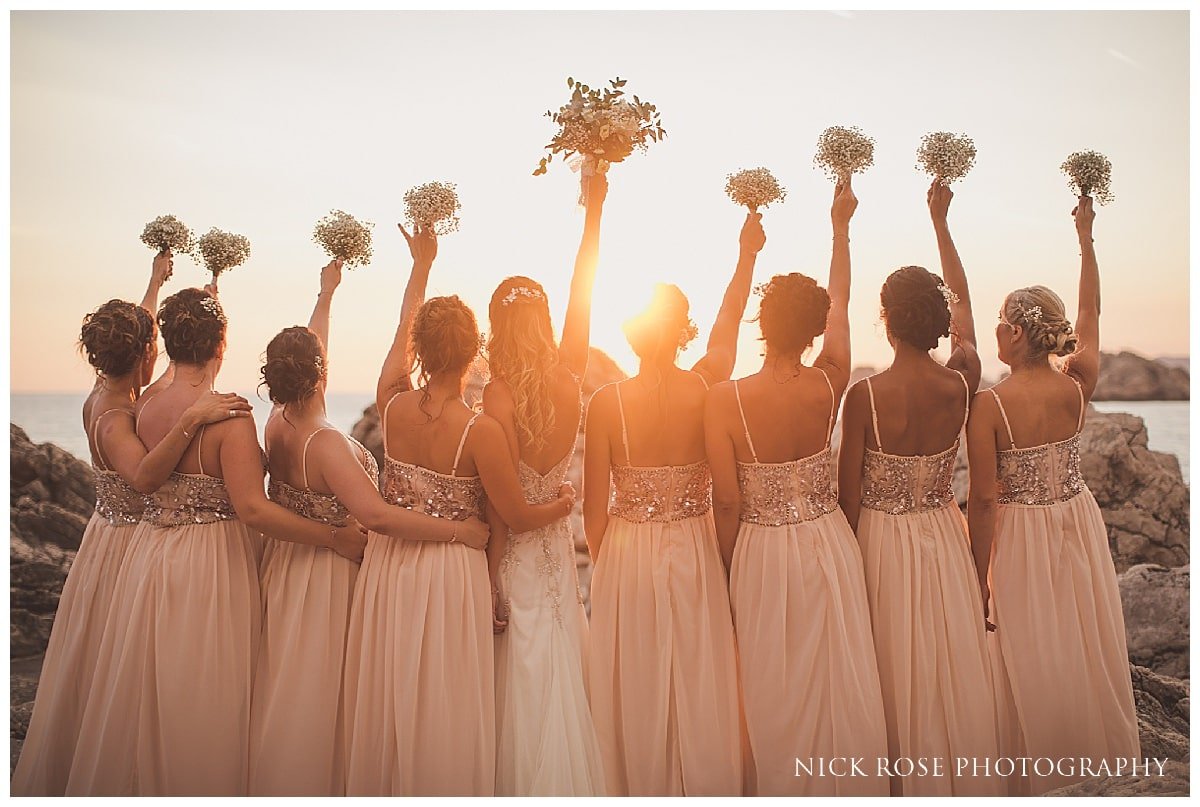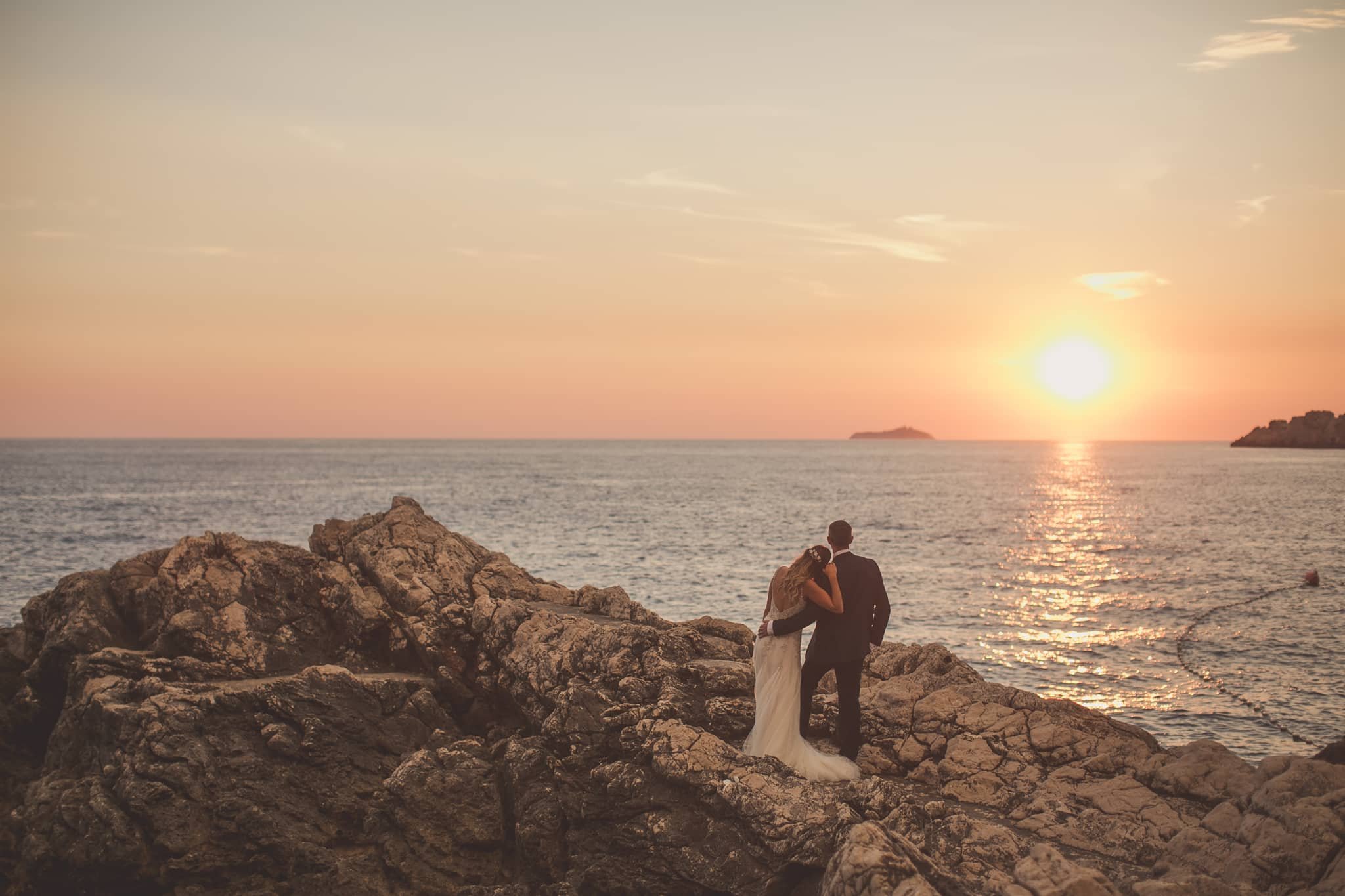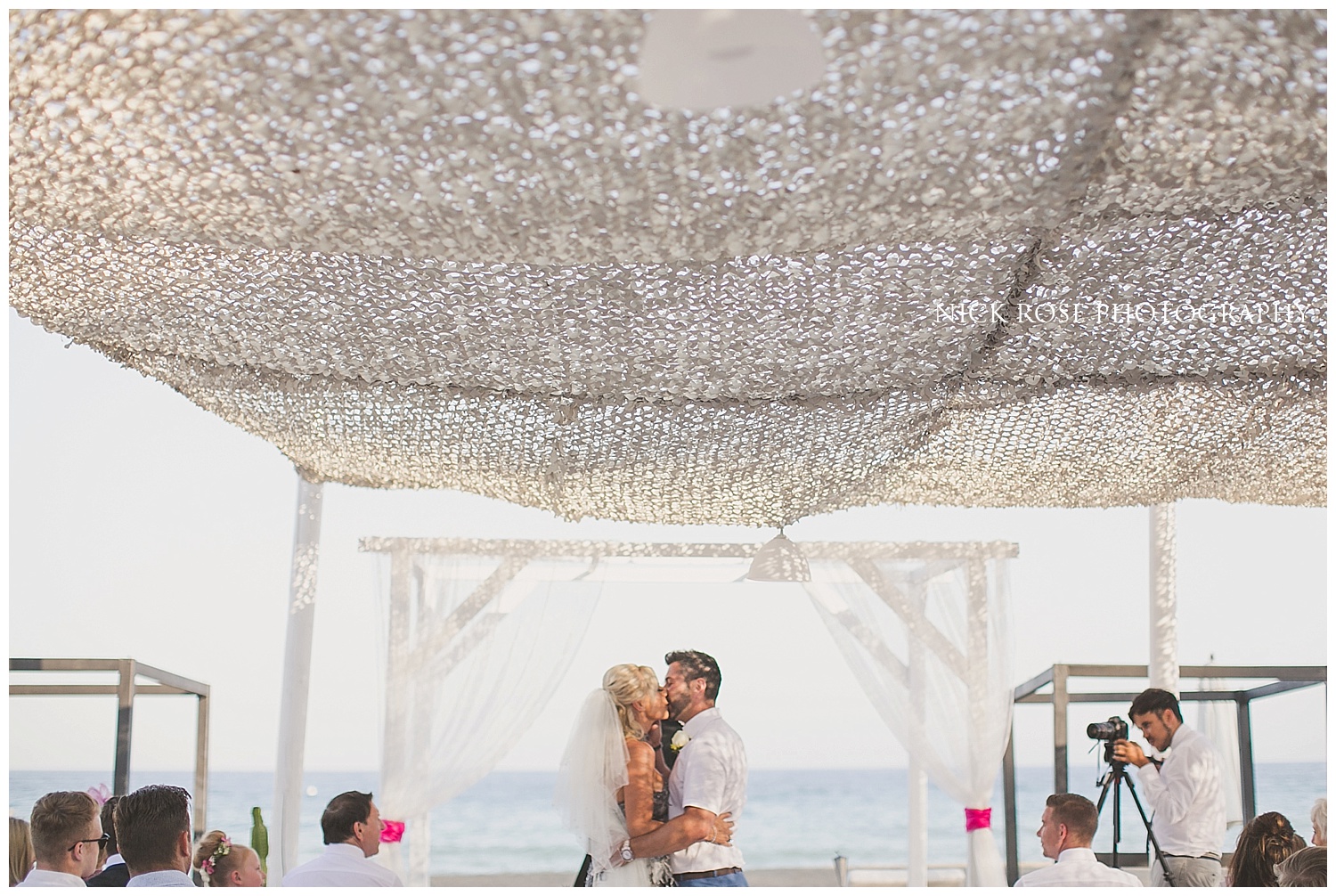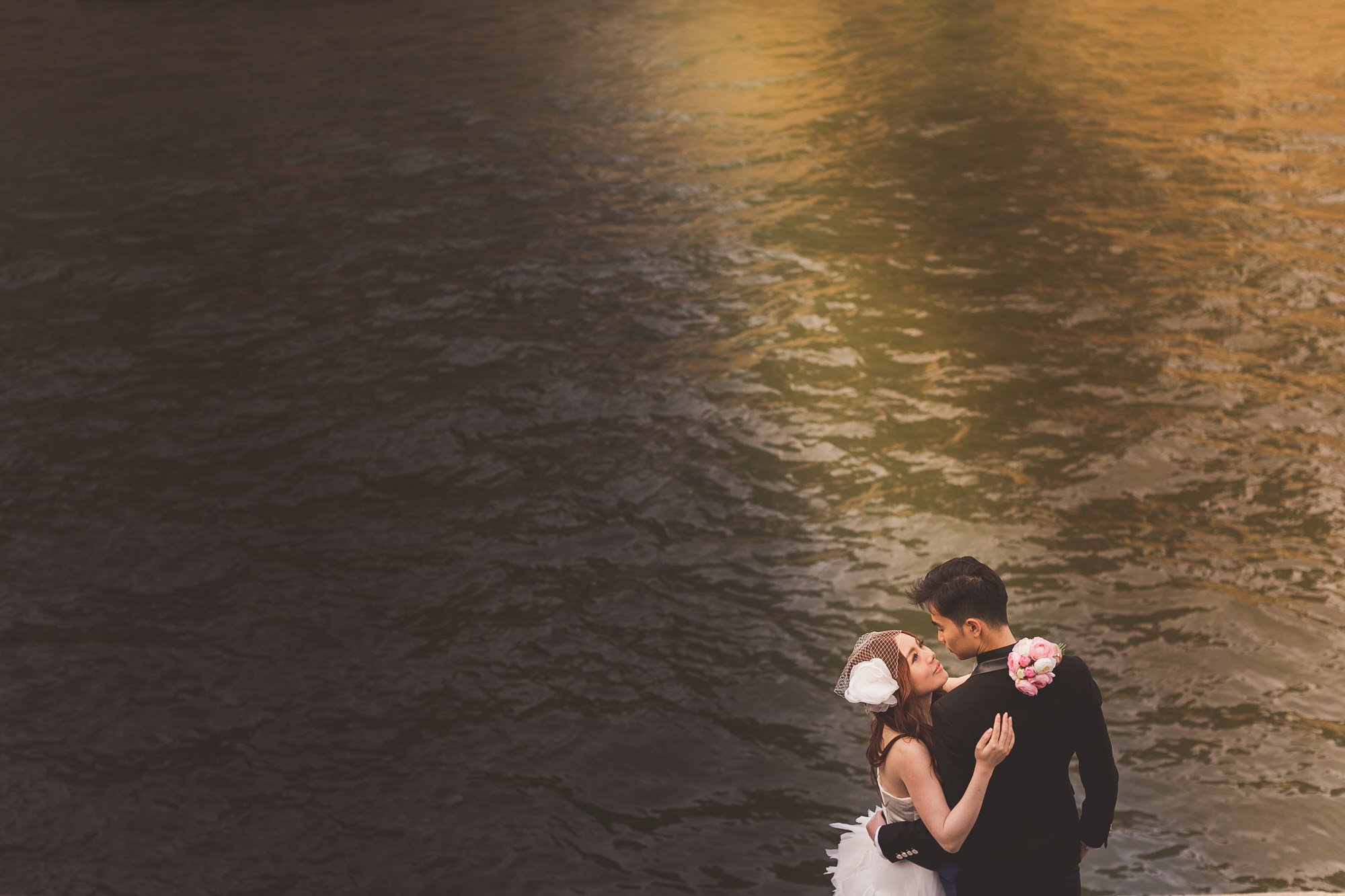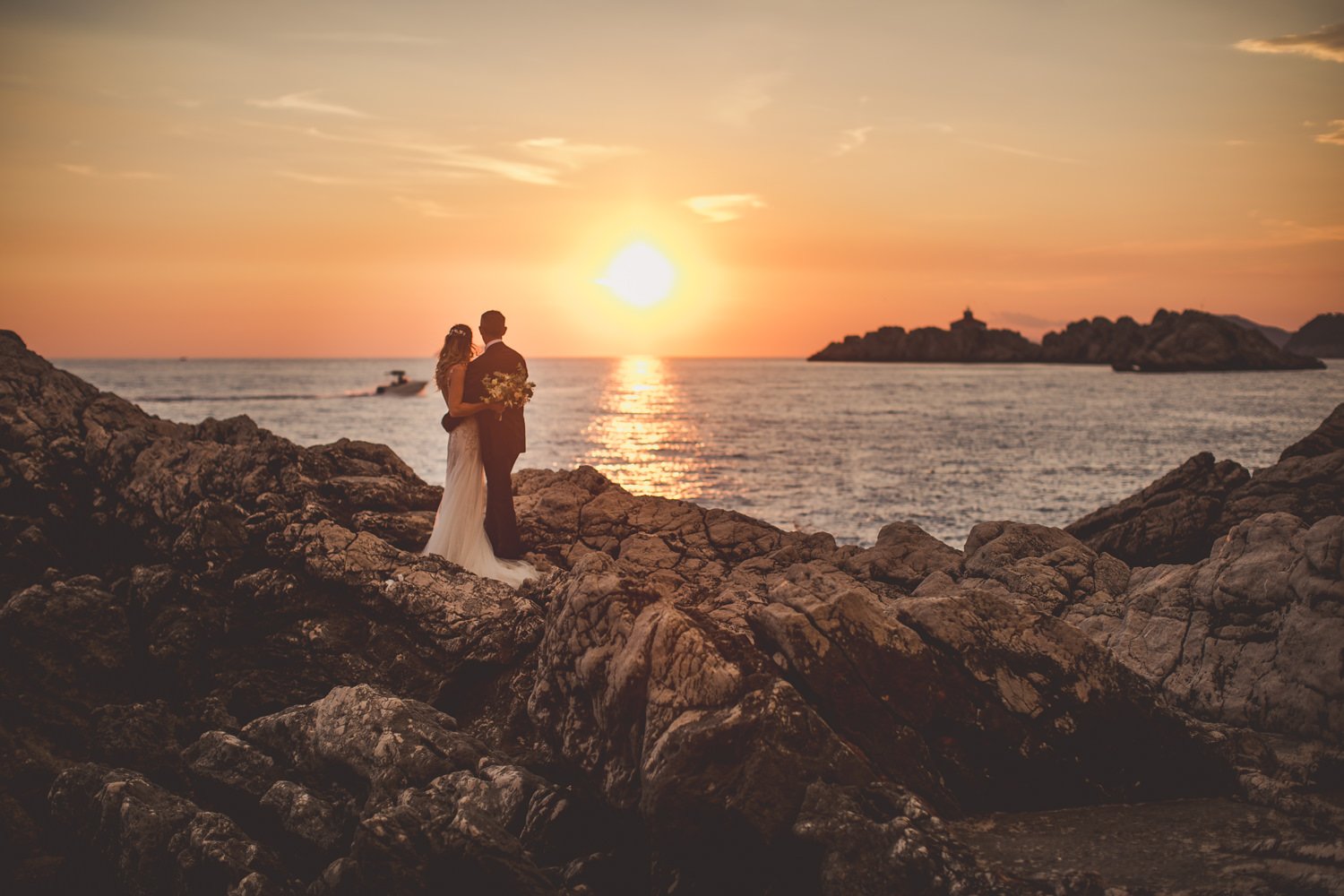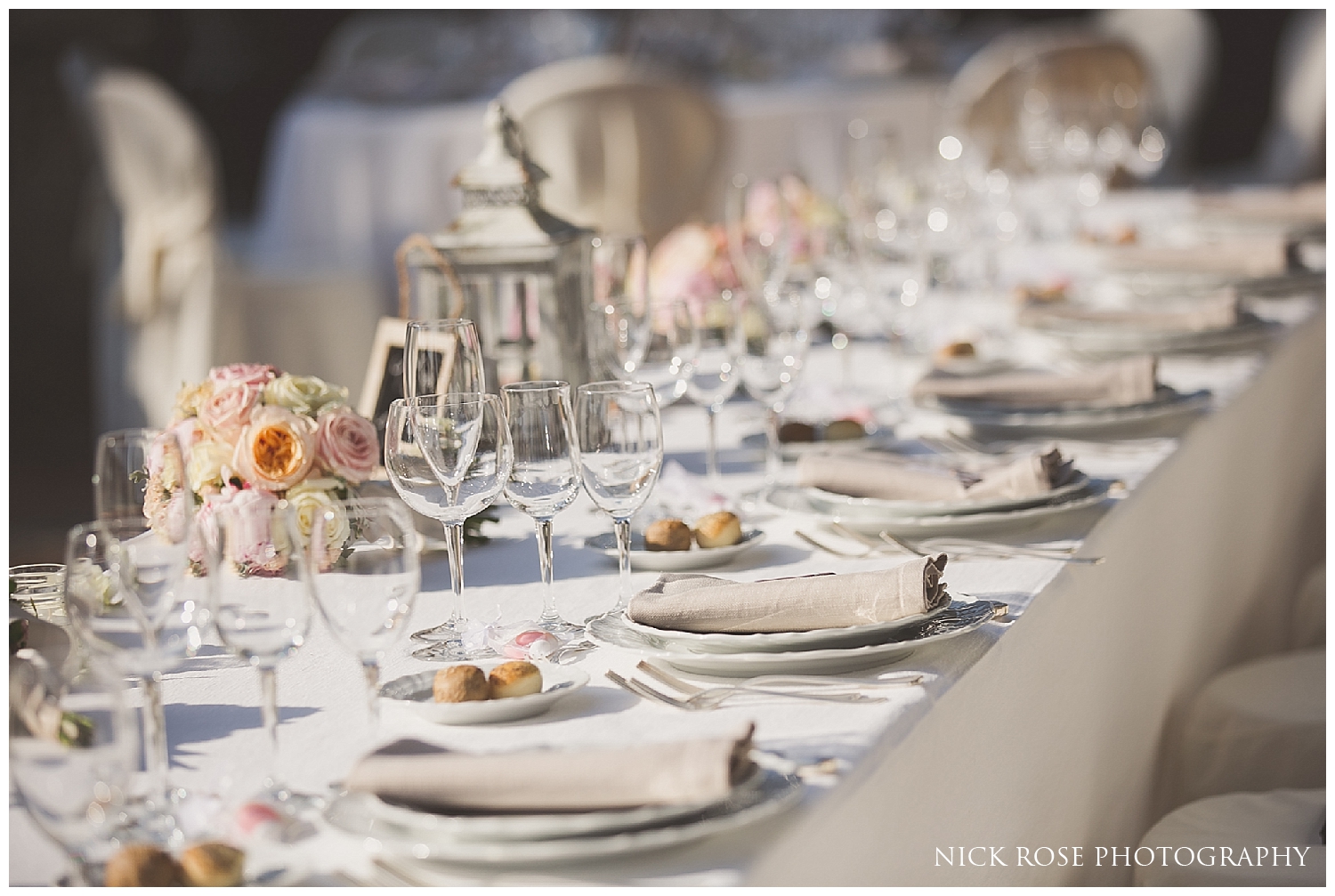
The Ultimate Guide to Planning a Destination Wedding
Plan a destination wedding with this ultimate guide
As a destination wedding photographer, I've been a part of some incredible weddings around the world. From beach celebrations in the Seychelles and elopements under the waterfalls of Iceland to city weddings in the heart of Hong Kong, I have been fortunate enough to capture some incredible celebrations. For many couples, a destination wedding is a dream and something that they will remember for years, but there's a lot of planning and thought that needs to go into planning the perfect destination wedding, so hopefully, the information here will help. Welcome to a comprehensive guide from a destination wedding photographer for planning the destination wedding of your dreams.
Whether you've always envisioned saying "I do" on a sandy beach, in a charming European villa, or amidst breathtaking natural scenery, I'm here to help you navigate the world of wedding planning and make your special day unforgettable. From choosing the perfect location to organising travel logistics and creating an itinerary filled with wonderful experiences, I've got you covered. Let's dive into this ultimate guide packed with expert tips and invaluable advice to ensure your destination wedding is everything you've ever dreamed of.
Indian Weddings
Destination Weddings
London Weddings
Pre Weddings
Choosing the Perfect Destination for Your Wedding
The first step in planning a destination wedding is selecting the ideal wedding location. It's essential to choose a perfect destination that suits your style and preferences. Here, we will explore how to consider various factors in order to find the location that ticks all the boxes for your special day.
Factors to Consider when Choosing a Destination Wedding Location
Climate: Consider the weather conditions and seasonal variations of potential locations. Determine if it aligns with your wedding vision and desired atmosphere.
Accessibility: Evaluate the ease of travel for you and your guests. Check for direct flights, transportation options, and travel time.
Local Regulations: Understand the legal requirements for getting married in your chosen destination. Research marriage licenses, residency requirements, and any necessary documentation.
Some of the most popular destination wedding locations around the world:
Santorini, Greece: Mesmerizing sunsets, beautiful beaches, and iconic blue-domed churches.
Tuscany, Italy: Breathtaking landscapes, vineyards, and charming villas.
Iceland: Stunning waterfalls and ice lagoons in the land of fire and ice.
Maui, Hawaii: Tropical paradise, stunning coastline, and a blend of adventure and relaxation.
St Lucia: Lush rainforests, volcanic peaks, and beautiful beaches.
Dubai: Luxurious shopping, iconic skyscrapers, and a vibrant nightlife.
Paris, France: Romantic atmosphere, world-class museums, and delicious food.
Portugal: Charming towns, stunning beaches, and delicious wine.
These are just a few examples of the many stunning destinations available for your destination wedding. Each location offers unique features and experiences that can make your wedding truly memorable.
Explore more locations and sample destination weddings in the posts below.
Setting a Realistic Budget for Your Destination Wedding
Planning a destination wedding can be an exciting and memorable experience. However, it's important to set a realistic budget to avoid any financial stress and ensure that your dream wedding stays within your means. When budgeting for a destination wedding, there are several key factors to consider:
1. Travel Expenses
Travel costs will likely be one of the largest expenses for your destination wedding. This includes flights, accommodation, and transportation for you, your partner, and possibly your guests. When researching travel options, consider off-peak seasons and airline deals to save on costs. Additionally, explore different accommodation options such as all-inclusive resorts or rental properties to find the best value for money.
2. Venue Costs
The cost of the wedding venue will depend on the location, season, and the specific package or services offered. Be sure to inquire about any additional fees, such as ceremony site fees or minimum spending requirements for the reception. Compare multiple venues and negotiate to get the best deal possible without compromising on your vision.
3. Wedding Packages and Services
Many venues offer all-inclusive wedding packages that include services such as catering, decorations, and coordination. While these packages may simplify the planning process, consider whether they align with your budget and preferences. If you opt for à la carte services, research local vendors and compare prices to find the best value.
4. Guest Considerations
Take into account the number of guests attending your destination wedding and factor in their travel and accommodation expenses. Consider offering a range of accommodation options to suit different budgets, and provide your guests with information on affordable transportation and activities in the area.
5. Wedding Attire and Accessories
Don't forget to budget for your wedding attire, including the dress, suit, accessories, and any alterations or customization. If you're planning a beach wedding, keep in mind that lightweight and breathable fabrics may be more suitable for the climate.
6. Contingency Fund
It's always wise to include a contingency fund in your budget to account for unexpected expenses or last-minute changes. Aim to set aside around 10% of your total budget as a buffer.
7. Prioritize Your Spending
Decide which aspects of your destination wedding are most important to you and allocate a larger portion of your budget to those areas. This could be the venue, entertainment, or photography. By prioritising your spending, you can ensure that your budget is allocated in a way that aligns with your vision.
By carefully considering these factors and setting a realistic budget, you can confidently plan your dream destination wedding without any financial surprises. Now let's take a look at a sample destination wedding budget to give you a better idea of how to allocate your funds:
This is just a sample budget breakdown, and you can adjust the percentages based on your priorities and preferences. Remember, the most important thing is to set a budget that suits your financial situation and allows you to have the destination wedding of your dreams.
| Expense Category | Percentage of Budget |
|---|---|
| Travel Expenses | 30% |
| Venue Costs | 25% |
| Wedding Packages and Services | 20% |
| Guest Considerations | 10% |
| Wedding Attire and Accessories | 10% |
| Contingency Fund | 5% |
Researching and Booking Your Wedding Venue
Choosing the perfect wedding venue for your destination wedding is a crucial decision. It sets the tone and provides the backdrop for your special day. With so many options available, it's important to conduct thorough research to ensure you find the ideal venue that meets all your requirements.
Conducting Thorough Research
When researching wedding venues for your destination wedding, consider the following:
Location: Look for venues that are conveniently located for both you and your guests. Consider proximity to accommodation options, transportation hubs, and local attractions.
Style and Ambience: Determine the style and ambience you envision for your wedding day. From glamorous ballrooms to rustic barns, there are various options to suit different tastes and themes.
Capacity and Facilities: Assess the capacity of each venue to ensure it can accommodate your guest list comfortably. Additionally, consider the available facilities such as ceremony spaces, reception areas, and catering options.
Reviews and Recommendations: Read reviews from couples who have previously booked the venue. Seek recommendations from trusted sources such as wedding planners or friends who have had a destination wedding.
Visiting Potential Venues
Once you have shortlisted potential wedding venues, it's essential to visit them in person or through virtual tours. This allows you to assess the venue's appearance, layout, and overall suitability for your wedding day. Take note of the following during your visits:
Visual Appeal: Evaluate the aesthetic appeal of the venue. Consider its architecture, interior design, and outdoor spaces.
Accessibility: Assess the accessibility of the venue for you and your guests. Is it easily reached by various modes of transportation? Are there any potential logistical challenges?
Staff and Service: Interact with the venue's staff to gauge their professionalism and responsiveness. A dedicated and experienced team can contribute to a smooth and enjoyable wedding experience.
Photography Opportunities: Look for picturesque spots within the venue that would serve as stunning backdrops for your wedding photos. Making sure you have a great photographer who is experienced with destination weddings is key to getting the best memories.
Negotiating Contracts
Once you've chosen your dream wedding venue, it's time to negotiate and finalise the contract. Pay attention to the following:
Pricing and Packages: Review the pricing structure and packages offered by the venue. Ensure that all costs, including any additional fees, are clearly outlined.
Terms and Conditions: Carefully read and understand the terms and conditions of the contract. Pay attention to cancellation policies, payment schedules, and any restrictions or limitations.
Flexibility: Discuss any specific requirements or customisations you may need for your wedding day. Make sure the venue is willing to accommodate your requests.
Insurance: Consider wedding insurance to protect your investment in case of unforeseen circumstances.
By conducting thorough research, visiting potential venues, and negotiating contracts diligently, you can secure the perfect wedding venue for your destination wedding. Prepare a checklist of your requirements and evaluate each venue accordingly. Trust your instincts and choose a venue that resonates with your vision and style.
Wedding Photos from London and around the World on Instagram
Coordinating Travel and Accommodation for Your Guests
When planning a destination wedding, it's important to make sure your guests have a smooth and enjoyable travel experience. Coordinating travel arrangements, providing accommodation options, and handling transportation logistics are key aspects of ensuring their comfort and convenience.
Here are some tips to help you effectively coordinate travel and accommodation for your guests:
1. Recommend Local Accommodation Options
Suggesting a range of accommodation options that cater to different budgets and preferences can help your guests find the perfect place to stay. This may include hotels, resorts, vacation rentals, or even nearby bed and breakfasts. Provide them with a list of recommendations and useful information, such as proximity to the wedding venue and any special group discounts available.
2. Coordinate Group Bookings
If you have a large number of guests attending your wedding, consider coordinating group bookings to make the process easier for everyone. Reach out to hotels or resorts to inquire about group rates and block rooms for your guests. This can help ensure that everyone stays together and simplifies transportation arrangements to and from the venue.
3. Arrange Transportation Services
Transportation logistics can play a crucial role in the success of your destination wedding. Consider providing transportation services, such as shuttle buses or private transfers, to transport your guests to and from the airport, accommodation, and wedding venue. This eliminates the hassle of renting cars or relying on public transportation, ensuring everyone arrives on time and stress-free.
4. Communicate Travel Information Clearly
Clear and timely communication is vital when it comes to coordinating travel for your guests. Provide them with detailed information about the nearest airports, recommended flight options, and any necessary visa requirements. Additionally, share any transportation schedules or arrangements, along with contact information for the designated point of contact who can assist with any travel-related queries.
5. Create a Welcome Package
Make your guests feel valued and welcomed by creating a thoughtful welcome package. Include useful items such as maps, local recommendations, a schedule of wedding-related events, and any necessary information they may need during their stay. This not only enhances their overall experience but also makes them feel appreciated as part of your special day.
Coordinating travel and accommodation for your destination wedding ensures that your guests are well taken care of and can fully enjoy the celebration. By providing them with the necessary information and assistance, you can create a memorable experience for everyone involved.
Navigating Legal Requirements and Documentation
When planning a destination wedding, it is essential to familiarise yourself with the legal requirements and documentation necessary for getting married in your chosen location. Each destination has its own set of regulations, so staying informed is crucial to avoid any legal complications on your special day.
Here are the key steps to navigate the legal requirements and ensure a smooth process:
Research the Destination's Marriage Laws: Before finalising your decision, research and understand the specific legal requirements for getting married in your chosen destination. Look for information on marriage licenses, residency requirements, and any specific documentation needed.
Obtain a Marriage License: Once you have chosen your destination, familiarise yourself with the process of obtaining a marriage license. This may involve submitting certain documents, such as passports, birth certificates, or divorce decrees if applicable. Ensure you start this process well in advance to allow time for any required translations or apostilles.
Understand Residency Requirements: Some destinations have residency requirements, which means you may need to arrive a certain number of days or weeks before your wedding date to fulfil these requirements. Make sure you understand and plan accordingly to meet these obligations.
Arrange Necessary Documentation: In addition to a marriage license, you may need to arrange other documentation such as affidavits of single status, certificates of no impediment, or translations of documents. Consult with the local authorities or a wedding planner in your destination to determine the specific requirements.
To illustrate the legal requirements and documentation process for destination weddings, here is a table presenting examples of different destinations and their specific regulations:
| Destination | Marriage License Requirements | Residency Requirements | Additional Documentation |
|---|---|---|---|
| Italy | Affidavit of single status, birth certificate, passport copies | None | None |
| Jamaica | Application form, passports, birth certificates, divorce decrees if applicable | 24 hours | None |
| Greece | Applications, passports, birth certificates, divorce decrees if applicable | 8 days | Certificates of no impediment, translations |
| Bali | Passports, birth certificates, divorce decrees if applicable | 6 days | None |
Remember that this table provides general information and regulations may change. Always consult the local authorities or a wedding planner specializing in destination weddings for the most up-to-date and accurate information.
By understanding the legal requirements and arranging the necessary documentation in advance, you can ensure a stress-free and legally compliant destination wedding experience.
Planning Your Destination Wedding Itinerary
Designing a well-structured wedding itinerary ensures that your guests have a memorable experience. From pre-wedding events to the ceremony and reception, and even fun activities and tours, a carefully planned itinerary sets the stage for a truly unforgettable destination wedding.
Scheduling Pre-Wedding Events
Before the big day, it's essential to organize pre-wedding events to welcome your guests and create a sense of togetherness. Consider hosting a rehearsal dinner, a welcome reception, or even a group excursion to explore the local attractions. These events not only allow everyone to bond but also help set the tone for your wedding celebration.
Coordinating the Ceremony and Reception
The heart of your destination wedding is, of course, the ceremony and reception. Coordinate with your venue and vendors to create a seamless flow of events. Whether you opt for an intimate beach ceremony or a grand ballroom reception, ensure that the timeline and logistics are well-planned. This will allow you and your guests to enjoy every moment of the celebration fully.
Organising Fun Activities and Tours
Make your destination wedding a week-long celebration by planning exciting activities and tours for your wedding party and guests. Consider local attractions, such as city tours, sightseeing cruises, or adventure activities like hiking or snorkelling. These add-ons will not only entertain your guests but also provide them with an opportunity to explore and experience the beauty of the destination.
Having a variety of options ensures that there is something for everyone to enjoy, creating lasting memories for all involved. Keeping your guests engaged throughout their stay will make your destination wedding an unforgettable experience.
| Wedding Itinerary Tips | Benefits |
|---|---|
| Create a balance between wedding-related events and free time | Allows guests to relax and explore the destination at their own pace. |
| Include a mix of group activities and individual options | Provides flexibility for guests with different preferences. |
| Consider the logistics and distances between venues and activities | Minimizes travel time and ensures a smooth flow of events. |
| Communicate the itinerary clearly to your guests | Helps guests plan their schedule and make any necessary arrangements. |
Working with Local Wedding Vendors and Suppliers
When planning your dream destination wedding, collaborating with local wedding vendors and suppliers is essential. These experts have the local knowledge and experience to bring your vision to life. Here are some tips to help you work effectively with them:
1. Research and Select the Right Vendors
Take the time to research and choose local vendors who specialise in destination weddings. Look for vendors with a proven track record and positive reviews from previous clients. Consider their expertise, style, and ability to understand your unique requirements.
2. Communicate Your Vision Clearly
Effective communication is key to ensuring that local vendors understand your wedding vision. Be clear about your preferences, style, and expectations. Share your wedding inspiration, mood boards, and any specific details you want to incorporate. Regularly communicate with vendors to provide feedback and ask questions.
3. Visit the Destination in Advance
If possible, plan a visit to the destination before your wedding. This will allow you to meet with vendors in person, discuss your requirements, and view their work firsthand. It's a valuable opportunity to build relationships and establish a connection with your vendors.
4. Manage Contracts and Payments
Ensure that you have clear contracts with your vendors that outline the services they will provide, the payment terms, and any additional details such as cancellation policies. Read the contracts carefully and ask for clarifications if needed. Keep track of payments and deadlines to ensure smooth transactions.
5. Handle Potential Language Barriers
In some cases, language barriers may arise when working with local vendors. Be proactive in finding solutions to overcome these barriers. Consider hiring a translator or working with vendors who have English-speaking staff. Clearly communicate your requirements and ask for confirmations to avoid misunderstandings.
Remember, local vendors and suppliers are valuable sources of knowledge and expertise. By building a strong working relationship with them, you can ensure that your destination wedding is a truly memorable and seamless experience.
Planning Your Destination Wedding Decor and Theme
Creating a cohesive wedding theme and decor adds a personal touch to your destination wedding. Whether you're dreaming of a romantic beachside ceremony or a rustic mountain getaway, the right decor can transform your venue into a magical setting that reflects your unique style and enhances the beauty of your chosen destination.
Choose a Theme That Complements Your Destination
When selecting a wedding theme, consider the natural surroundings, cultural elements, and local traditions of your destination. Incorporate these elements into your decor to create a seamless and authentic experience for you and your guests. From seaside nautical themes to tropical-inspired motifs, the possibilities are endless.
Experiment with Color Schemes
Colour plays a vital role in setting the mood and atmosphere of your wedding. Choose a color scheme that complements your destination and reflects the vibe you want to create. For beach weddings, soft pastels and shades of blue can evoke a serene and romantic atmosphere, while vibrant tropical hues add a lively touch to a destination in the tropics.
Add Unique Touches
Personalise your destination wedding decor by incorporating unique touches that reflect your personality and love story. From custom signage and monogrammed decor items to incorporating local crafts or souvenirs, these special details will make your wedding truly one-of-a-kind.
Consider the Venue and Layout
Take the venue and layout into account when planning your decor. Consider the size of the space, the focal points, and the areas where guests will spend the most time. Use strategic decor elements to highlight key features, create cosy seating areas, and define spaces for different activities.
Beachside Romance
Colour Scheme: Soft pastels, hues of blue
Decor Elements: Sheer fabrics, seashells, starfish, driftwood accents, sand-filled centrepieces
Enchanted Forest
Color Scheme: Earthy tones, deep greens
Decor Elements: Moss, ferns, fairy lights, nature-inspired centrepieces, tree branch archways
Rustic Elegance
Colour Scheme: Neutral tones, shades of brown
Decor Elements: Burlap, lace, twinkle lights, wooden accents, mason jar candle holders
Tropical Paradise
Colour Scheme: Bright and bold tropical colours
Decor Elements: Palm leaves, tropical flowers, tiki torches, bamboo chairs
Vintage Glamour
Color Scheme: Gold, ivory, and blush pink
Decor Elements: Antique mirrors, vintage frames, pearls, lace tablecloths
Winter Wonderland
Colour Scheme: White, silver, and icy blues
Decor Elements: Crystal icicles, snowflake decorations, white fur table runners, twinkling white lights
Garden Party
Colour Scheme: Soft greens, floral hues
Decor Elements: Flower garlands, lanterns, potted plants as centrepieces, garden lights
Bohemian Chic
Colour Scheme: Rich, vibrant jewel tones
Decor Elements: Macrame hangings, eclectic rugs, succulents, dream catchers
Destination Wedding Menu Planning and Catering
Delicious food and drinks are essential elements of any wedding celebration. A destination wedding not only offers a stunning backdrop for your special day but also allows you to indulge in local cuisine and flavors. Here's how you can plan a mouthwatering menu that will delight your guests and create a memorable culinary experience.
Selecting a Catering Service
When it comes to choosing a catering service for your destination wedding, it's important to find one that understands your vision and can provide exceptional service. Consider hiring a local caterer who specializes in both traditional and contemporary dishes. They will have a wealth of knowledge about the local cuisine, ensuring an authentic and memorable dining experience.
Planning a Menu That Showcases Local Cuisine
One of the highlights of a destination wedding is the opportunity to immerse yourself in the local culture, and food plays a significant role in that experience. Work closely with your catering service to create a menu that showcases the best of local cuisine. Incorporate regional specialties and traditional dishes to give your guests a taste of the destination.
Accommodating Dietary Restrictions
It's crucial to consider any dietary restrictions or allergies when planning your wedding menu. Ensure there are vegetarian, vegan, and gluten-free options available for guests with specific dietary requirements. Communicate these options to your catering service beforehand, so they can make the necessary preparations.
Remember to offer a range of options to cater to various tastes and preferences. Your catering service will be able to suggest additional dishes and customise the menu to suit your wedding theme and style.
With careful planning and collaboration with a professional catering service, you can create a destination wedding menu that reflects the unique flavours of your chosen location and leaves a lasting impression on your guests.
Destination Wedding Photography
Over 100,000 miles travelled, more than 50 destinations visited and millions of photos captured.
Finding the Best Destination Wedding Photography
Planning a destination wedding is an exciting adventure, and capturing the magic of your special day requires skilled photography. Your chosen photographer will be your partner in creating visual memories that will last a lifetime.
Finding the Perfect Photographer:
Research: Explore photographer portfolios, focusing on styles and experience capturing destination weddings.
Seek Recommendations: Ask previously-wed couples or local wedding planners for trusted professionals with a proven track record.
Connect and Communicate: Schedule meetings (in-person or virtual) to discuss your vision, timeline, and desired shots. Clear communication is key!
Highlighting Your Destination's Essence:
Share Your Story: Tell your photographer about the specific aspects of your chosen location that resonate with you as a couple.
Embrace the Surroundings: Whether it's breathtaking scenery, lush gardens, or a vibrant city, discuss how to capture the unique atmosphere.
Capture Special Moments: If there are specific moments or locations you want immortalized, communicate these desires to ensure the photographer is prepared.
Explore My Work:
To see how I can capture the essence of your destination wedding, I invite you to explore my portfolio or get in touch as I would love to hear about your plans.
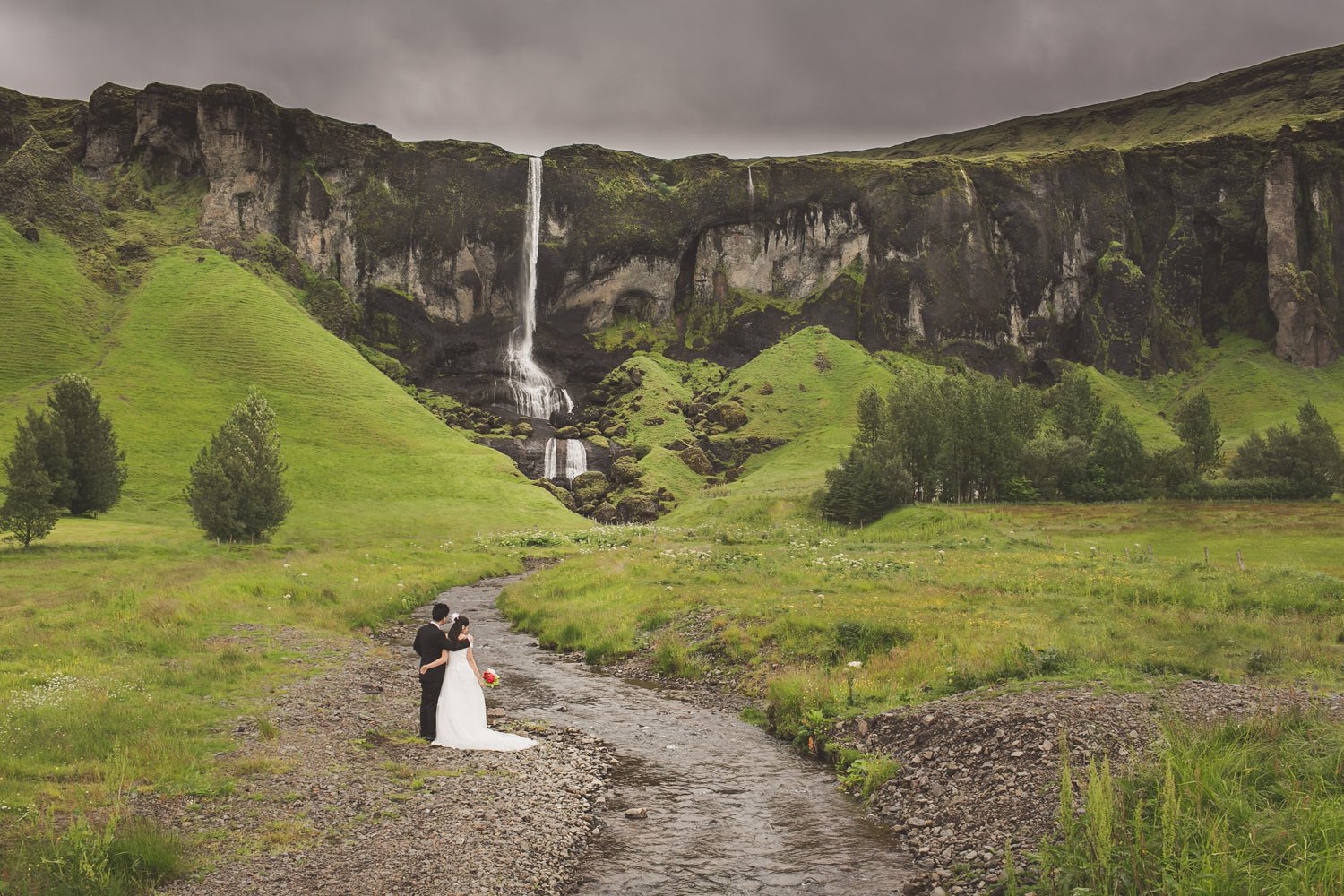




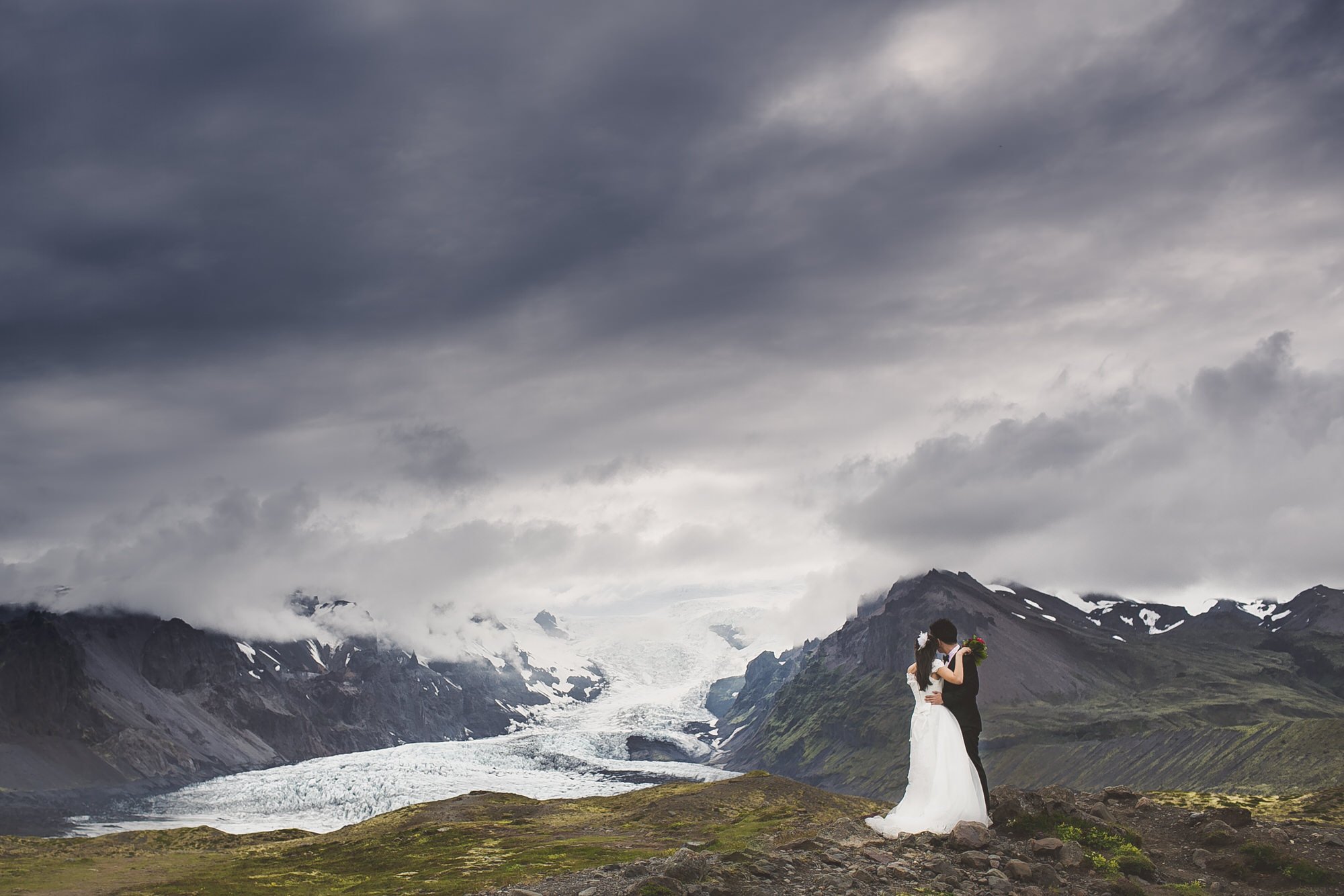

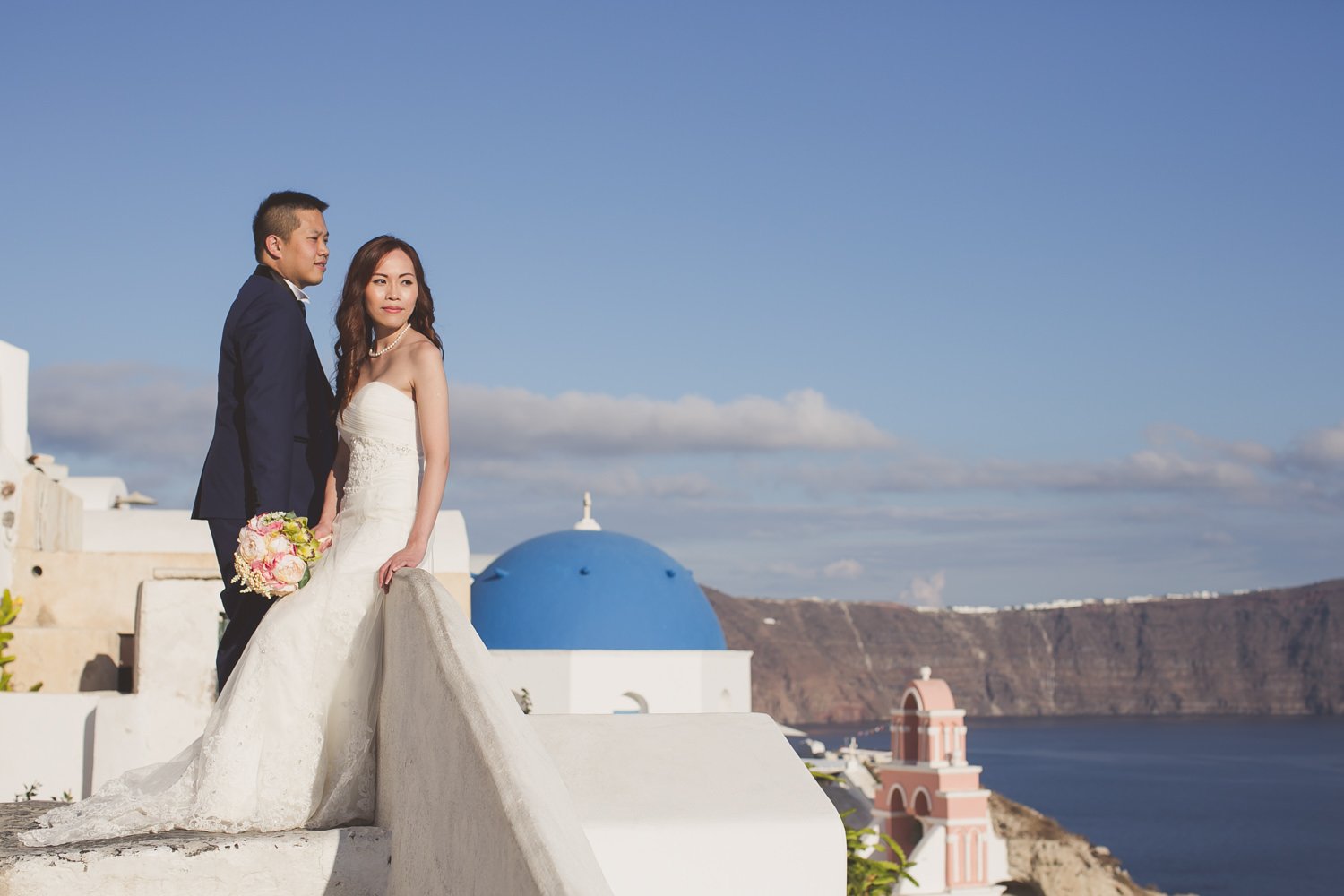




Find out more about me as a Destination Wedding Photographer.
You can find out more about me as a destination wedding photographer here.
To see my portfolio as a London and international wedding photographer, then visit my homepage, or you can explore some more of my weddings and pre-weddings from the UK and around the world by viewing recent wedding work on the blog.
If you are interested in getting in touch to discuss your wedding plans and the possibility of working with me to tell your story, then get in touch. Can’t wait to hear all about your plans for the big day!
-
Destinations

-
Miles Travelled

-
Countries Visited

Managing Guest RSVPs and Communication
Coordinating with your guests and managing their RSVPs is an essential part of planning a destination wedding. Effective communication and timely updates about travel details are key to ensuring a smooth experience for everyone involved. In this section, we will provide you with strategies to handle guest RSVPs efficiently and keep your communication with guests seamless.
1. Utilize Online RSVP Platforms
Take advantage of online RSVP platforms to simplify the RSVP process for your guests. These platforms allow guests to respond with just a few clicks, eliminating the need for paper invitations and manual tracking of RSVPs. Choose a user-friendly platform that enables you to collect essential information such as dietary restrictions and accommodation preferences.
2. Send Save-the-Dates and Invitations Early
When planning a destination wedding, it's crucial to send out save-the-date cards well in advance. This gives your guests ample time to make travel arrangements and reserve accommodations. Follow up with detailed invitations that include information about the wedding location, travel logistics, and RSVP instructions. Encourage guests to RSVP as soon as possible to help you plan accordingly.
3. Make Communication Channels Easily Accessible
Provide multiple channels for your guests to communicate with you and receive updates. Alongside traditional means of communication like email and phone, consider setting up a dedicated wedding website or social media group where guests can find all the information they need. Regularly update these channels with important updates, travel tips, and FAQs to keep guests well-informed.
4. Create a Detailed Itinerary
Outline a comprehensive itinerary for your destination wedding and share it with your guests. Include details about pre-wedding events, transportation arrangements, and any planned activities or excursions. A clear and well-organized itinerary allows guests to plan their time effectively and ensures they don't miss out on any key events.
5. Send Reminder Emails and Updates
As the wedding date approaches, send reminder emails to guests who haven't yet RSVPed. This gentle nudge can prompt them to respond and allows you to confirm attendance numbers for catering and seating arrangements. Keep guests updated about any changes or additions to the itinerary, travel information, or other pertinent details to avoid confusion or last-minute surprises.
Destination Wedding Photography Packages
Capture the magic of your destination wedding with stunning photography!
I specialize in destination weddings, offering comprehensive packages to suit your needs. I'm familiar with various wedding styles and traditions, ensuring I can capture every special moment of your celebration.
What sets me apart:
Experience: I have extensive experience photographing weddings of all kinds, including Indian weddings and multi-day celebrations.
Complimentary Pre-Wedding Shoot: Capture beautiful pre-wedding images in your chosen location, included in all packages.
Personalized Approach: I work closely with you to understand your vision and create a seamless photography experience.
Ready to discuss your dream destination wedding?
Contact me today to learn more about my packages and how I can help you preserve these precious memories.
Wedding Attire and Styling for Your Destination Wedding
Deciding on the perfect wedding attire for a destination wedding involves considering climate, comfort, and style. Whether you're the bride, groom, bridesmaid, groomsman, or a guest, it's essential to strike the right balance between looking beautiful and feeling at ease in your chosen destination. Here are some tips to help you make the right fashion choices for your special day.
Bridal Attire
As the star of the day, it's important for the bride to choose a wedding gown that reflects her personal style while taking into account the location's climate. For a beach wedding, lightweight fabrics such as chiffon or organza are ideal, paired with minimalistic silhouettes or flowy designs. If you're getting married in a colder destination, consider dresses with long sleeves or delicate lace details for an elegant touch.
Groom Attire
Grooms can opt for lightweight suits made from linen or cotton for tropical destinations. These breathable fabrics will keep them comfortable throughout the day. However, if the wedding is taking place in a more formal setting, a classic tuxedo or a tailored suit in a light color, such as light gray or beige, can create a sophisticated look. Don't forget to accessorise with a stylish tie or bowtie that complements the overall theme.
Bridesmaid and Groomsmen Outfits
It's essential for bridesmaids and groomsmen to choose attire that not only matches the overall wedding style but also ensures their comfort. For beach weddings, flowy dresses in soft pastel shades or lightweight linen suits are great choices. If the wedding is held in a more traditional setting, opt for elegant cocktail dresses or classic suits in complementary colours that enhance the aesthetic of the wedding.
Guest Attire
As a guest, it's important to dress appropriately for the destination and the wedding theme. For a beach or outdoor wedding, opt for breezy sundresses, linen pants, or lightweight suits. Remember to consider the dress code specified on the invitation and dress accordingly. If in doubt, you can always reach out to the couple or the wedding planner for guidance.
Regardless of your role in the wedding, it is always a good idea to choose comfortable footwear that suits the terrain. Heeled sandals or wedges are perfect for beach weddings, while dress shoes or flats work well for more formal settings.
Remember, your wedding attire is not only a reflection of your personal style, but it also sets the tone for the entire event. Selecting the right outfits that embrace the unique atmosphere of your destination will ensure that you and your loved ones look your best and feel confident on your special day.
Explore Destination Weddings from Around the World
Planning Your Honeymoon Alongside Your Destination Wedding
Planning your honeymoon alongside your destination wedding is a smart way to save time and effort. By combining the two, you can seamlessly transition from celebrating your wedding to enjoying a romantic getaway. Here's how you can plan your dream honeymoon while ensuring it complements your destination wedding.
Choose a Honeymoon Destination that Complements Your Wedding Location
When selecting your honeymoon destination, consider locations that align with the ambience and theme of your destination wedding. Whether you're dreaming of a tropical paradise or a cultural adventure, choose a location that offers something unique and memorable for both you and your partner.
For a beach destination wedding, consider extending your stay at a nearby luxury resort or exploring secluded islands for a more intimate honeymoon experience.
If your wedding takes place in a vibrant city, book a hotel in the heart of the action and immerse yourself in the local culture and attractions.
For nature-loving couples, choose a honeymoon destination that offers breathtaking landscapes, such as national parks or mountain ranges.
Wine enthusiasts may opt for a honeymoon in a picturesque wine region, where they can indulge in vineyard tours and tastings.
Create a Special Honeymoon Itinerary
To make your honeymoon truly unforgettable, plan a unique itinerary that combines relaxation, adventure, and romance. Consider including activities and experiences that reflect your shared interests and passions as a couple.
Indulge in couples' spa treatments and candlelit dinners on the beach for a romantic escape.
Embark on thrilling adventures like hiking, snorkelling, or hot air balloon rides to create lasting memories.
Immerse yourself in the local culture by exploring museums, art galleries, and historical landmarks.
Relax and unwind by spending lazy days on the beach or by the pool, savouring each other's company.
By planning a honeymoon itinerary that combines relaxation and adventure, you can create a well-rounded experience that caters to your unique preferences as a couple.
Remember to consider the logistics of transitioning from your wedding location to your honeymoon destination. Research transportation options and plan accordingly to minimize any potential travel stress.
Embark on your married life with an unforgettable honeymoon experience that seamlessly blends with your destination wedding. By choosing a complementary destination and crafting a special itinerary, you and your partner can celebrate your love in style.
Managing Wedding Day Logistics and Timelines
Planning a destination wedding comes with its own set of challenges, but effective management of wedding day logisticsand timelines can ensure a seamless and stress-free experience. From transportation arrangements to vendor coordination, careful planning is key to making your special day a memorable one.
1. Transportation
When organising a destination wedding, it's essential to plan transportation for you, your wedding party, and your guests. Whether it's arranging flights, booking airport transfers, or providing shuttle services between venues, careful logistics can make travel smooth and convenient for everyone involved. Consider hiring a reliable transportation company or working with your wedding planner to handle these arrangements.
2. Vendor Coordination
Coordinating with your wedding vendors is crucial to ensure that everything runs according to schedule on your wedding day. From photographers and videographers to caterers and musicians, stay in touch with them leading up to the wedding and provide them with a detailed timeline. Clear communication and regular updates will help avoid any confusion or last-minute changes.
3. Creating a Detailed Timeline
A detailed wedding day timeline is essential for keeping everything on track. Start by outlining the sequence of events, from the ceremony to the reception. Consider the time needed for each activity, including hair and makeup, photography sessions, and travel time between venues. Share the timeline with your wedding party, vendors, and venue staff to ensure everyone is on the same page.
Sample Wedding Day Timeline:
10:00 AM: Bride and bridesmaids' hair and makeup begin
12:00 PM: Groom and groomsmen get dressed
1:00 PM: Ceremony starts
2:00 PM: Confetti and group photographs
3:00 PM: Couple photographs
4:00 PM - 7:00 PM: Wedding breakfast
7:00 PM: Speeches and Cake cutting
8:00 PM: First Dance
9:00 PM: Sunset photoshoot on the beach
Note: This is a sample wedding day timeline. Please customise it according to your specific wedding plans.
By managing wedding day logistics and timelines effectively, you can ensure that everything runs smoothly from start to finish, allowing you to relax and fully enjoy your destination wedding. Take the time to plan and communicate with your wedding team to create a memorable and stress-free experience for you, your partner, and your guests.
The Importance of Wedding Insurance for Your Destination Wedding
Planning a destination wedding is an exciting and unforgettable experience. However, it's crucial to protect your investment and ensure peace of mind on your special day. This is where wedding insurance comes in. With a comprehensive wedding insurance policy, you can safeguard yourself against unforeseen circumstances that may arise.
Wedding insurance provides financial protection in the event of cancellations, postponements, or unexpected emergencies. It covers a range of scenarios, including severe weather, vendor no-shows, or even personal illness. By investing in wedding insurance, you can mitigate the financial risks associated with a destination wedding and focus on celebrating your love.
When selecting a wedding insurance policy, it's important to consider factors such as coverage limits, deductibles, and exclusions. Look for a policy that specifically caters to destination weddings and offers coverage for travel-related expenses and venue mishaps. Take the time to read through the policy details carefully and consult with an insurance professional to ensure your needs are met.
Ultimately, wedding insurance provides you with peace of mind during the entire wedding planningprocess. By protecting your investment and having a safety net in place, you can embrace the excitement of your destination wedding and enjoy every moment knowing that you are financially protected. So, don't overlook the importance of wedding insurance – it's a small price to pay for the peace of mind it brings.
Destination Weddings: FAQ’s
How do I choose the perfect destination for my wedding?
When choosing a destination for your wedding, consider factors such as climate, accessibility, and local regulations. Research popular destination wedding locations and find one that suits your style and preferences.
How do I set a realistic budget for my destination wedding?
Planning a destination wedding requires careful budgeting. Consider travel expenses, accommodation, venue costs, and other essential elements. Prioritise your spending and make the most of your wedding budget.
How do I research and book my wedding venue?
To find the perfect wedding venue at your destination, conduct thorough research. Visit potential venues and negotiate contracts. Explore different types of venues, from beachfront resorts to picturesque vineyards, and make an informed decision.
How do I coordinate travel and accommodation for my guests?
Coordinate travel arrangements for your guests and provide accommodation options. Handle transportation logistics and make your guests feel welcome and comfortable throughout their stay.
What legal requirements and documentation do I need for a destination wedding?
Every destination has its own legal requirements for getting married. Obtain marriage licenses, understand residency requirements, and arrange necessary documentation to avoid any legal complications on your special day.
How do I plan my destination wedding itinerary?
Design a well-structured wedding itinerary that includes pre-wedding events, the ceremony and reception, and fun activities for your wedding party and guests.
How do I work with local wedding vendors and suppliers?
Collaborate with local wedding vendors and suppliers by researching, selecting, and communicating with them effectively. Manage contracts and handle potential language barriers to ensure they understand your vision and deliver the best services possible.
How do I plan the decor and theme for my destination wedding?
Create a cohesive wedding theme and decor that complements your chosen destination. Explore different themes, color schemes, and decor ideas to design a stunning setting for your special day.
How do I plan the menu and catering for my destination wedding?
Select a catering service, plan a menu that showcases local cuisine, and accommodate dietary restrictions to ensure your guests have a fantastic culinary experience.
How do I choose a photographer and videographer for my destination wedding?
Select professionals who specialise in destination wedding photography and videography. Discuss your expectations and ensure they capture the essence of your special day to preserve memories that will last a lifetime.
How do I manage guest RSVPs and communication for my destination wedding?
Communicate effectively with your guests, update them about travel details, and handle RSVPs efficiently to ensure smooth coordination and manage attendance numbers.
How do I select the perfect attire and styling for my destination wedding?
Consider climate, comfort, and style when choosing bridal and groom attire, bridesmaid and groomsmen outfits, and attire for guests. Look stunning while embracing the unique atmosphere of your destination.
How do I plan my honeymoon alongside my destination wedding?
Combine your wedding and honeymoon seamlessly by choosing a honeymoon destination that complements your wedding location. Create a special itinerary to start your married life with an unforgettable honeymoon experience.
How do I manage wedding day logistics and timelines for my destination wedding?
Plan transportation, coordinate vendor tasks, and create a detailed timeline for your wedding day to minimise stress and ensure everything runs smoothly from start to finish.
Why is wedding insurance important for my destination wedding?
Wedding insurance protects your investment and helps manage unforeseen circumstances. Select the right policy to stay prepared and ensure peace of mind on your special day.
How early should I plan a destination wedding?
You should start planning your destination wedding as far in advance as possible, ideally 12 to 18 months before the wedding. This gives you ample time to research and secure the best wedding destination, book your venue and vendors, and give your guests plenty of notice to make travel arrangements.
Can a wedding planner help you plan the perfect international wedding?
Absolutely! A destination wedding planner or on-site wedding coordinator can be invaluable in navigating the complexities of planning a wedding in a foreign country. They can offer insights into local customs, help secure reputable vendors, assist with language barriers, and ensure everything runs smoothly on your big day.
What ideas are there for what I should include in welcome bags to give my guests?
Welcome bags are a wonderful way to show appreciation for your guests' effort to travel. Include items like local snacks, a map or guidebook of the area, sunscreen (for beach destinations), a mini first-aid kit, and perhaps a personalised note thanking them for joining your celebration. It's a thoughtful gesture that sets a fantastic tone for the wedding weekend.
What's the best way to inform guests about the wedding details?
Create a wedding website with all the pertinent information about your destination wedding, including travel and accommodation details, itinerary for wedding-related events, dress code, and suggestions for things to do in the area. This acts as a complete guide and central point for your guests to get everything they need to know.
How do I choose the right wedding dress for a destination wedding?
Consider the climate and location of your wedding destination when choosing your wedding dress. Lighter fabrics work well for beach or tropical settings, while more structured fabrics might be suitable for a formal venue. Also, think about how easily the dress can be transported—some dresses are easier to pack and travel with than others.
Do I need a travel agent for planning a destination wedding?
While not strictly necessary, a travel agent experienced in destination weddings can be a huge asset. They can help you and your guests find the best travel deals, arrange group accommodations, and add those extra touches to make your travel experience smoother. Especially for large weddings or weddings in very remote locations, their expertise can save you a lot of time and stress.
How do I handle my wedding registry for a destination wedding?
A: For destination weddings, consider using a wedding registry that's easy for both you and your guests to manage from a distance. Many couples opt for honeymoon funds or registries with experiences rather than traditional home goods. You can also specify that gifts are not necessary, especially since guests will already be incurring travel expenses.


